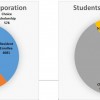Background
Charter schools are public schools that aren’t a part of the geographic district in which they are located. The first charter schools appeared in Minnesota in 1991. They were originally envisioned as supplementary to traditional public schools, with districts maintaining a degree of oversight.
The term “charter school model” now serves as a blanket term for schools which offer a range of differing academic programming. Some charter schools were founded to service specific student communities, such as children with dyslexia. Others were created by private companies to promote a particular model of education or instruction. In some cases, charters are run as magnet schools by universities and colleges. Still others are formed by non-profit organizations.
That model has changed drastically over the years. Many advocacy groups now position charter schools as competitors — rather than collaborators — with traditional public schools. Along with school vouchers, experts often discuss charter schools as part of a broader “market-based reform” movement.
Despite their differences, charter schools do share other common features: They cannot charge tuition or turn away any student for any reason. They are funded on a per pupil basis. They are not obligated to provide a variety of services required of traditional public schools, such as bussing, food and school age care. If their enrollment exceeds their capacity, then the school must hold a random lottery.
Currently only about half of Hoosiers live in a county with at least one charter school. The movement centers on Indiana’s major metropolitan centers in Indianapolis and Gary-East Chicago. Some Indiana towns are 70 miles or more from the nearest charter school.



